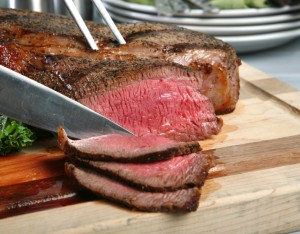An outbreak of E. coli associated with the Longhorn Steakhouse in Cincinnati Ohio has prompted some questions about eating at restaurants. While the source of this outbreak was most likely leafy greens, E. coli outbreaks are usually associated with improperly handled or inadequately cooked meat.
 Whenever I’m at a restaurant, I always ask some questions before ordering. I ask if the steak has been mechanically tenderized, and I ask if they check the temperature of their burgers with a food thermometer before serving. There are good scientific reasons behind these questions. Foodsafety.gov has a chart of the safe minimum cooking temperatures for all foods likely to harbor pathogenic bacteria.
Whenever I’m at a restaurant, I always ask some questions before ordering. I ask if the steak has been mechanically tenderized, and I ask if they check the temperature of their burgers with a food thermometer before serving. There are good scientific reasons behind these questions. Foodsafety.gov has a chart of the safe minimum cooking temperatures for all foods likely to harbor pathogenic bacteria.
Steaks that have been mechanically tenderized should be cooked to 160 degrees F, or well done. The Safe Food Coalition has been advocating for labeling of mechanically tenderized beef products since 2009. The meat is pierced with fine needles to break up fibers in the meat. While this makes the steak more tender, it can also move pathogenic bacteria, such as E. coli, to the interior of the steak. Then, cooking that steak to rare, medium rare, or medium assures that the bacteria will not be destroyed and can make someone sick.
Attorney Fred Pritzker, who has represented clients sickened by mechanically tenderized steaks, has said, “meat companies and restaurants should inform consumers about this manipulation of beef and the dangers that go along with it. Even if fewer consumers purchase this type of beef and sales are hurt, the consumer has the right to know what they are eating.”
All ground meats should be cooked to a final internal temperature of 160 degrees F. Bacteria present on all meat surfaces are mixed throughout when meat is ground. That means pathogenic bacteria will be present throughout the ground mixture and are only destroyed with thorough cooking.
And what about produce? When you eat at a restaurant, you just have to take a chance on these foods. All produce should be thoroughly washed before serving, and should be carefully handled to prevent cross-contamination. But there is no way a consumer can know if leafy greens, mangoes, or cantaloupe were handled properly from the farm to the table. You can help protect yourself by checking your state or city’s restaurant inspection reports, which may be posted online.




